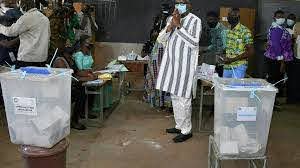Burkisa Faso Voting

Polls closed in Burkina Faso on Sunday after a presidential and parliamentary election dominated by the threat of Islamist violence that prevented voting in hundreds of villages.
President Roch Kabore is seeking a second five-year term, campaigning on achievements such as free healthcare for children under the age of five and paving some of the red dirt roads that snake across the arid West African country.
But a surge in attacks by groups with links to al Qaeda and Islamic State has eclipsed everything. The violence has cost more than 2,000 lives this year alone.
Three weeks after Kaboré’s inauguration, al Qaeda’s regional branch attacked a hotel and a café in Burkina Faso’s capital, Ouagadougou, killing 32 people.
At least 400,000 people, or nearly 7 percent of the electorate, were unable to cast their votes.
“There are a number of polling stations that had opened in the East and in other regions that had to close because of threats,” said Electoral Commission Chairman Newton Ahmed Barry.
“Individuals have banned people from taking part in the vote,” he added during a mid-day assessment, although he felt that “on the whole … everything is going well”.
Kaboré faces stiff opposition from former finance minister Zéphirin Diabré, who was the runner-up in 2015, and Eddie Komboigo, leader of the party of Blaise Compaoré, who served as president for 27 years and was overthrown in 2014.
“I like Kaboré but he hasn’t managed the security situation. The north has been forgotten, there is no government authority there,” said Tiadiane Bonkoungou, who sells blankets and drapes at a market stall in Ouagadougou.
Analysts expect a tight race that could go to a second round if no candidate wins more than 50 percent. Provisional results of the first round are expected by midweek.
Continued bloodshed
Campaigning ran alongside continued bloodshed and there was fear of jihadist attacks on voting day. Fourteen soldiers were killed in an ambush in the north claimed by the Islamic State group earlier this month, one of the deadliest attacks on the military in the five-year insurgency.
Jihadist violence in the north – as in neighbouring Sahel states Mali and Niger – has become intertwined with clashes between ethnic groups.
The Fulani community has in particular been targeted for recruitment by jihadists, and attacks regularly spark reprisal attacks, continuing the cycle of violence. Humanitarian groups have condemned massacres of Fulani civilians by pro-government militias or the army.
Almost all of Kaboré’s challengers have called for dialogue with the jihadists to be explored – a suggestion Kaboré has emphatically rejected.



